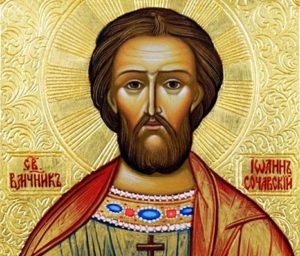 The Great Martyr John the New, Sochavski (1330-1340)
The Great Martyr John the New, Sochavski (1330-1340)
Celebrating his birthday, on the feast of the Nativity of the Baptist John, he had the opportunity to celebrate the Liturgy in the church in honor of the holy great martyr John the New, Sochavsky in the village Luzhany, in the Chernivtsi region. By the way, in the 18th century, the relics of this saint were in this settlement all day long.
The thought flashed, and perhaps on this day the great martyr John Sochavsky celebrated his birthday, perhaps his heavenly patron was the Forerunner. Inspiration from kinship (in thought) with this saint prompted a detailed acquaintance with his life. And I came to the conclusion that John Sochavsky is not only a Romanian and Moldavian Orthodox saint, but also a Ukrainian saint.
The life of St. John Sochavskyis associated with the territories of four regions of today’s Ukraine, namely: Odessa, Lviv, Ivano-Frankivsk and Chernivtsi.
Fact № 1. St. John suffered, about 1340, in the city of Belgrade Bosphorus, which is now called Belgorod-Dniester. Throughout its history, in different languages, this city was called “White Castle”, “White Fortress” or “Belgorod” and was a major trade and military center on the Black Sea between the Dniester, Danube and Prut rivers.
In 1402, through the efforts of the ruler of Moldavia, Alexander the Good, the relics of the great martyr John were moved from Belgorod to Suceava.
Fact 2. In 1686, the invasion of Moldova by Polish troops led by King Jan Sobieski in the summer of 1686 ended in numerous robbery. Returning to Poland, Polish Catholics seized the treasures of the Moldovan Orthodox Metropolitanate and the relics of John the New, which they left in the town of Stryj, now Lviv region.
Fact № 3. In 1690 the relics of the great martyr John were placed in the church, the Uniate monastery of the Basilian order, the city of Zhovkva near Lviv. Despite the fact that the relics were held captive by Catholics, Orthodox pilgrims from all over Galicia, Bukovina and Moldova gathered to worship the shrine. The relics remained in the city of Zhovkva until 1783.
Austria expanded its borders and included Galicia and Zhovkva. The voivode of Moldova appealed to the Austrian government to return the relics of St. John to Suceava. Emperor Joseph II issued an order, but it was not carried out.
From 1772, Austria expanded its borders even further, and in 1775 the city of Suceava was transferred to Austria by agreement. Bishop Dosipheus of Radovets (Hereskul) again appealed to Vienna to return the relics to Suceava. Time passed, but the Zhovkva monks (Greek Catholics) continued to resist the emperor’s order to return the holy remains, so the Galician governor was ordered to return the relics of John immediately.
Fact № 4. On June 30, 1783, after getting acquainted with the monarch’s order, the Uniate monks, under pressure, nevertheless agreed to return the Orthodox shrine.
Representatives of both sides drew up a protocol, sealed the sanctum and took it out of the temple. That same evening, the cart calmly reached LVIV with an invaluable treasure. The next day it set out on a journey to Suceava (now Romania) via TOVMACH, HALYCH, STANISLAV (Ivano-Frankivsk), KOLOMYA, ZABOLOTIV, SNYATYN, LUZHANY (where we prayed) and CHERNIVTSI.
Thus the great martyr consecrated Odessa Bessarabia with his blood and Galicia and Bukovina with the presence of his honest remains. Therefore, the holy great martyr John Sochavsky can be freely called a Ukrainian saint. The memory of the saint is celebrated on June 15.
P.S. Everyone who calls the feast of the Nativity of the Baptist John “John the Baptist’s Day” and jumps over the hearth should think seriously. After all, St. John Sochavsky was tortured and killed for refusing to undergo the rite of purification by fire in the city of Belgrade Bosphorus, which at that time was part of the Mongol Golden Horde – where they worshiped fire and jumped over it to serve satan.
